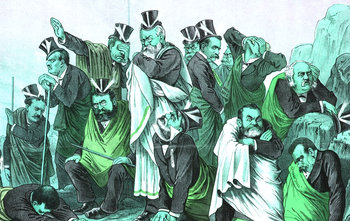Soundbite
A short catchphrase repeated ad nausea by media, advertising or propaganda. For example, "keep calm and carry on" was used by the British in WWII to promote a policy of business as usual.Thought-Terminating Cliche
A thought-terminating cliche is an often repeated phrase that is designed to shutdown conversation and thought. These are often short phrases with broad explanatory power but little actual meaning such as "that's life."Glittering Generality
A vague, popular and positive statement. Glittering generalities are often used as political slogans such as Warren G. Harding's 1920 campaign slogan "America First."False Dichotomy
Falsely presenting an issue as having only two sides when there are many grey areas between. For example, us vs them.Labeling
Labeling is the process of using short phrases to signal right and wrong ways of thinking. For example, labeling anyone who disagrees with you with a politically charged label such as "left" or "right".Deplatforming
A form of group shaming that involves making an accusation and then attempting to sideline and silence the accused by calling for them to be ignored by society. Also known as cancel culture.Groupthink
Environments that prioritize group harmony over the creative tension required for rational thought. For example, a safe space where active debate is banned by an institution or social group.Neglect of Nuance
Omitting nuance such as a news report that leaves out a minor detail that is the difference between an individual being viewed as guilty or innocent by the public.Ad Hominem
The practice of attacking the person instead of their argument. For example, labeling someone as a luddite if they point out a risk associated with a technology.Anonymous Authority
Suggesting that something is true or untrue based on the opinion of an anonymous authority for example "scientists believe..." or "that's not what the experts say..."Lie to Children
Lie to children is a term that describes the need to reduce accuracy and precision when explaining things in plain language to an audience that is unfamiliar with your domain. This term can easily be perceived as arrogant. If you understand something well enough you can explain it reasonably well in plain language.Appeal to Emotion
Emotional arguments such as "your idea could destroy this firm." This argument may neglect a comparison of risk and the fact that all action and inaction is surrounded in risk.Slippery Slope
Slippery slope is an argument that some small action necessarily leads to some terrible chain of events that cause large negatives. These tend to be an oversimplications unsupported by evidence as it is difficult to prove a small action will cause a gigantic chain reaction. For example, "first you take a day off sick and next your not going to work anytime you don't feel like it."Misleading Analogies
Analogies are a useful tool for explaining complex concepts in a concise way that is likely to be somewhat inaccurate. Sometimes these go too far such that they may dumb down a concept. For example, "love is war" might be an oversimplification that encourages couples to quarrel.Buzzwords
Academic, business and technology catchphrases that many use but few fully understand such as "postmodern", "innovation" or "AI."Grade Inflation
Reducing the complexity of education to allow more individuals to get a high grade with less effort.Dumbing Us Down
The theory proposed by John Taylor Gatto in the 1992 book "Dumbing Us Down" that education systems are intentionally designed to defeat intellectual capabilities such as divergent thinking in order to create a class of subservient workers.Engagement Over Substance
An individual or tool that seeks to engage an audience that is willing to compromise any pretense of accuracy. For example, a teacher who gives a completely inaccurate presentation of their subjects who is the most popular teacher in the school because they make learning fun. This is a common theme of "educational" media, software and public speaking.Tools of Oversimplification
Technology such as a spell checker that only knows a small percentage of words or search suggestions that encourage users to use less accurate search terms.Brand Recognition
Brand recognition is the tendency for customers to prefer products they recognize even if they have no information about the product. Marketers often capitalize on this by focusing on simple visual recognition of brand symbols over explaining their product. For example, advertising that simply associates brand symbols with an emotion or product packaging devoid of product information.Design Minimalism
The tendency of modern designers to create minimalistic user interfaces that require little intelligence to use correctly. For example, removing controls that are useful to advanced users or that beginners may eventually find useful.Notes
Dumbing down should not be confused with plain language. The ability to explain something in the simplest words possible and in the most direct way is a hallmark of intelligence. It can also be argued that the use of rich vocabulary allows for nuanced meaning that is important to intellectual content. Likewise, jargon is useful in an appropriate context to fully express meaning.| Overview: Dumbing Down | ||
Type | ||
Definition | The oversimplification of intellectual content and environments. | |
Related Concepts | ||


































